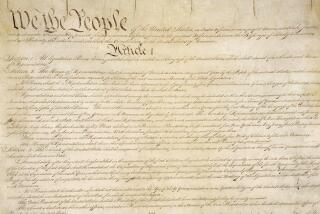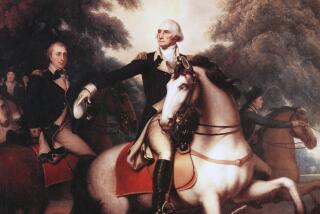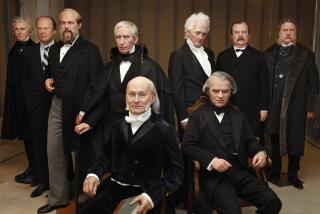Book review: ‘Colonel Roosevelt’ by Edmund Morris
Colonel Roosevelt
Edmund Morris
Random House: 770 pp., $35
After spending close to eight triumphant years in the White House, Theodore Roosevelt left Washington in 1909 on top of the world, a charismatic leader beloved by his countrymen and greeted as royalty everywhere he went. Declining an opportunity to seek a third term he almost certainly would have won, the 50-year-old man of action was determined to concentrate on pet projects and to spend more time with his beloved wife, Edith, and their six grown children. A more than capable writer (certainly the most prolific of all American chief executives), he had contracts for books and magazines to tackle as well.
FOR THE RECORD:
“Colonel Roosevelt”: A review last Sunday of the biography “Colonel Roosevelt” said Theodore Roosevelt was 56 at the time he completed his second term as president in 1909. He was 50. —
TR was so secure in what he had accomplished, in fact, that he eschewed the honorific “Mr. President” in retirement, preferring instead that everyone address him as “Colonel Roosevelt,” the rank he had earned as commander of a volunteer cavalry regiment during the Spanish American War — and the title that Edmund Morris uses for the third and concluding volume of an exemplary biography begun more than three decades ago with “The Rise of Theodore Roosevelt,” winner in 1980 of a Pulitzer Prize; “Theodore Rex,” the 2001 installment, focused on his tenure as 26th president of the United States.
But as the cascading events of a world in tumult played out, the final 10 years of Roosevelt’s life were anything but anticlimactic, certainly as interesting as those that preceded them, and almost as consequential. As Morris opens his continuing narrative in April 1909, the Colonel has just embarked on a safari through East Africa underwritten by Andrew Carnegie, accompanied by his son Kermit and served by 300 attendants. Mindful of the image he had built as naturalist and conservationist, Roosevelt had chosen to scale back on the number of animals he would shoot, concentrating instead on taking “specimens” he had agreed to collect for the Smithsonian Institution and that he would write about in a book that would make the national bestseller lists. After close to a year in the field, his total kill was 296 “items.”
Before returning to his home in Oyster Bay, N.Y., Roosevelt represented the United States at the funeral of King Edward VII in London, and in Oslo he accepted the Nobel Peace Prize he’d been awarded in 1906 for having helped end the Russo-Japanese War. “When he appears, the windows shake for three miles around,” one correspondent wrote of his popularity throughout Europe.
What generated particular speculation in the United States, however, were reports that the old Rough Rider was seriously considering a return to public life. His contempt was unmistakable for the reactionary policies of William Howard Taft, his hand-picked successor, getting stronger by the day and creating a rift in the Republican Party that would prove to be historic.
It is at this point that Morris shifts into high gear, following with riveting precision a succession of events in which Roosevelt mounted an aggressive campaign to regain the White House. “I am in this fight purely for a principle, win or lose,” he confided to a friend. Failing to wrest the Republican nomination from Taft, he founded the Progressive “Bull Moose” Party and finished second to Woodrow Wilson in the 1912 election.
“In just over ninety days,” Morris marvels, “he and his campaign committee had humbled a sitting president and decisively beaten a party that had dominated national politics for forty years.”
Not even a point-blank bullet to the chest fired by a would-be assassin weeks before the election — miraculously blunted by the rolled-up text of a speech he was about to give in Milwaukee, and indeed did give — could slow him down.
A return to the wild — this time a dangerous expedition down more than 900 miles of an uncharted Brazilian waterway known as the River of Doubt to collect more specimens — left him near death with malaria and blood poisoning from a leg injury. Then the ominous flexing of muscles in Europe put TR at growing odds with the neutrality policies of Wilson. Morris’ explication of this interlude is consistently rich and on point, with rapidly developing events providing a backdrop for the balanced examination he presents of his subject. TR’s almost pathetic plea that Wilson authorize him to organize a cavalry brigade to fight in Europe comes as a kind of coda to the once-energetic man’s richly productive life.
The loss of his youngest son, Quentin — a gifted aviator who had gone off to fight with the full blessings of his father — over France delivered a blow that left him forever shattered. Theodore Roosevelt was just 60 when he died in 1919, but by that time he was an old 60.
“I have already lived and enjoyed as much of life as any nine other men I know,” he had reasoned when deciding to brave the jungles of Brazil. “I have had my full share and if it is necessary for me to leave my remains in South America, I am quite ready to do so.”
His extraordinary life, finally complete, is now fully accessible in these three seamless volumes. Morris’ hand, it must be noted, has been sure and steady throughout, and not in any way to be compared with “Dutch,” the authorized biography of Ronald Reagan he wrote in 1999 that featured, among other literary devices, the use of an imaginary character named “Morris.” The TR trilogy is masterful, and can rightfully take its place among the truly outstanding biographies of the American presidency.
Basbanes is the author of many books, including “A Gentle Madness: Bibliophiles, Bibliomanes and the Eternal Passion for Books.” He is at work on “A Common Bond,” a cultural history of paper and papermaking.
More to Read
The biggest entertainment stories
Get our big stories about Hollywood, film, television, music, arts, culture and more right in your inbox as soon as they publish.
You may occasionally receive promotional content from the Los Angeles Times.





